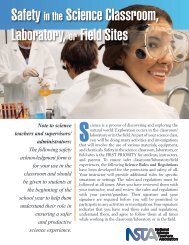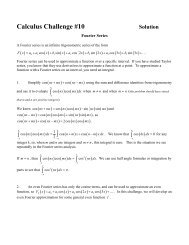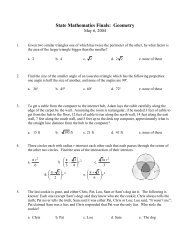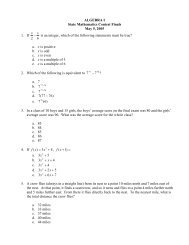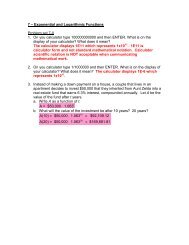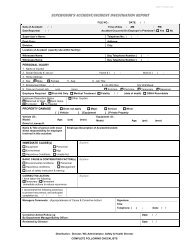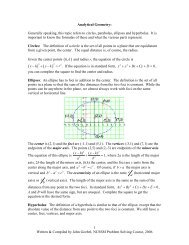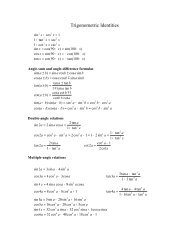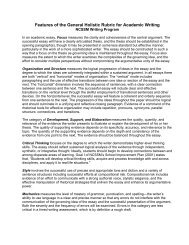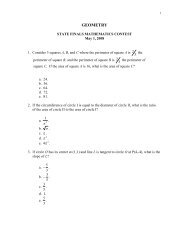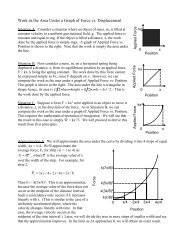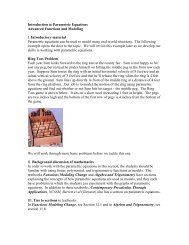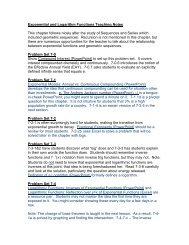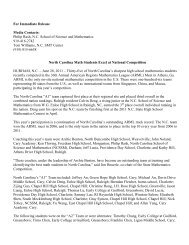NCSSM COURSE CAtAlOG - North Carolina School of Science and ...
NCSSM COURSE CAtAlOG - North Carolina School of Science and ...
NCSSM COURSE CAtAlOG - North Carolina School of Science and ...
Create successful ePaper yourself
Turn your PDF publications into a flip-book with our unique Google optimized e-Paper software.
Meeting pattern: Four periods per week.<br />
This course provides an underst<strong>and</strong>ing <strong>of</strong> the impact <strong>of</strong> society on the individual<br />
<strong>and</strong> the impact <strong>of</strong> the individual on society. Topics include: socialization,<br />
deviance, social class, inequality, family/life course, population changes, <strong>and</strong><br />
health care. This course also focuses on various levels <strong>of</strong> power <strong>and</strong> inequality<br />
<strong>and</strong> their impacts on groups, organizations, <strong>and</strong> multinational corporations.<br />
Finally, the course examines the various stages <strong>of</strong> social change over the course<br />
<strong>of</strong> history.<br />
SS370 Islamic Civilization<br />
One trimester<br />
Credit: One unit core elective credit.<br />
Meeting pattern: Four periods per week.<br />
William H. McNeill has written, “The rise <strong>of</strong> Islam <strong>of</strong>fers perhaps the most<br />
impressive example in world history <strong>of</strong> the power <strong>of</strong> words to alter human<br />
behavior in sudden, surprising ways.” This course invites students to journey into<br />
the remarkable story <strong>of</strong> a civilization that began with just one word — “Recite!”<br />
— heard by the Prophet Muhammad in a dusty Arabian cave in 610 CE. Our<br />
travels take us from Mecca across the globe, visiting the vibrant, diverse cultural<br />
regions collectively known as the “Islamic World,” where Islam has been the<br />
predominant religion since its expansion in the eighth century CE. Using an<br />
interdisciplinary approach incorporating the fields <strong>of</strong> religion, science,<br />
mathematics, art history, pop culture, <strong>and</strong> anthropology, we examine the<br />
development <strong>of</strong> the religion <strong>and</strong> the spread <strong>of</strong> empire, including the<br />
achievements <strong>of</strong> the Golden Age from “A to Q” — that is, from algebra to the<br />
Qu’ran. Other topics include divergences within Islam, popular faith <strong>and</strong><br />
practice, global Islamic movements, <strong>and</strong> recent political developments.<br />
SS402 AP Microeconomics (I)<br />
One trimester<br />
Credit: One unit core elective credit.<br />
Meeting pattern: Two 75-minute evening class meetings.<br />
This course <strong>of</strong>fers students an opportunity for immersion in both a fascinating<br />
discipline <strong>and</strong> in logical thinking. This immersive process involves not only an<br />
introduction to general Economic theory <strong>and</strong> more specific Microeconomic<br />
theory but also investigations into the very essence <strong>of</strong> the discipline itself.<br />
Students pursue this topic through three case studies or strategic problems<br />
involving pricing issues in product markets, various market structures, <strong>and</strong><br />
through industrial <strong>and</strong> social regulation within both an historic <strong>and</strong><br />
contemporary environment. We also address the business <strong>of</strong> inequality, poverty,<br />
<strong>and</strong> discrimination, again within both historic <strong>and</strong> contemporary environments.<br />
27



